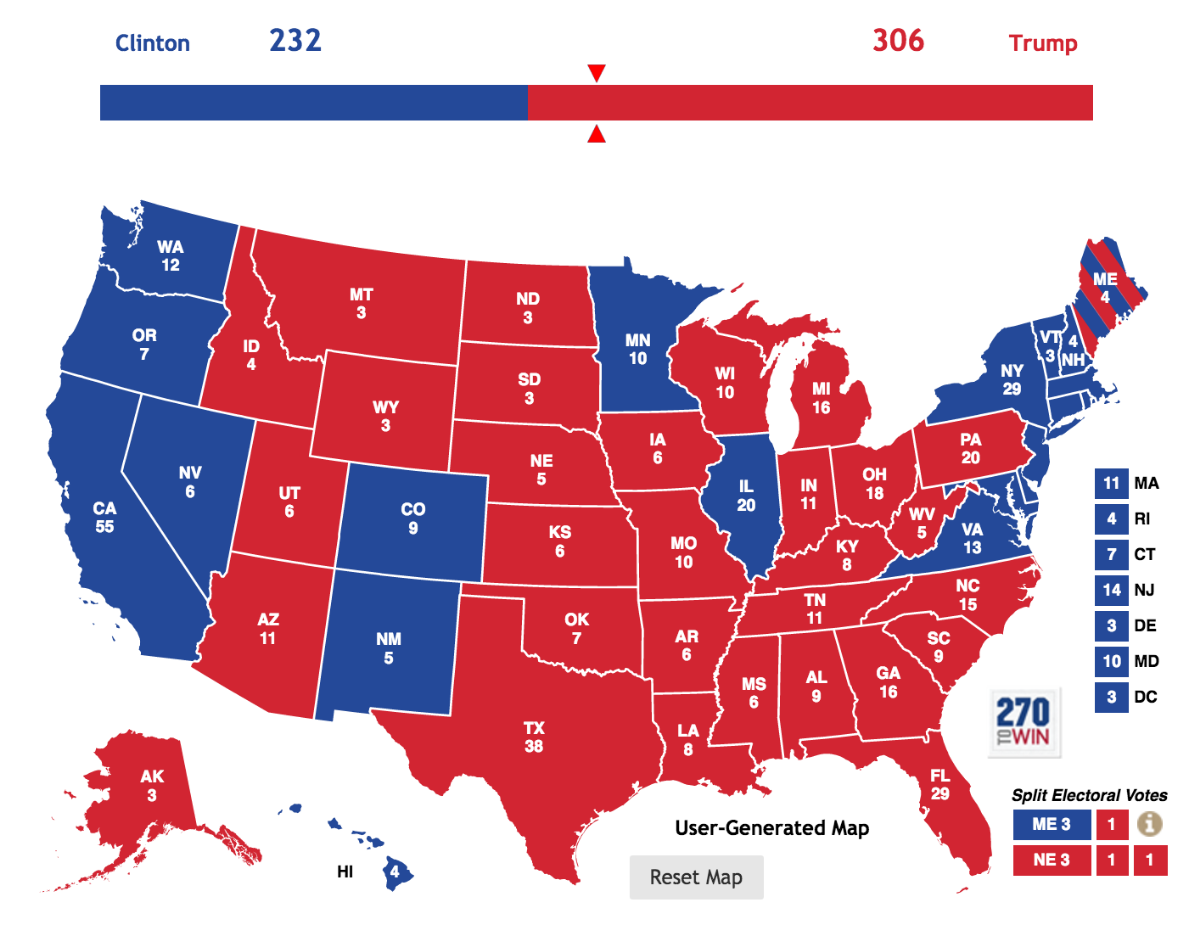Keep The Faith
Remember the 2016 Presidential election?. Trump won 304 to 227--the Electoral College vote. If you're good at math, you'll notice those numbers don't add up to 538, like they should. This is because there were seven--count 'em, seven--faithless electors. Colin Powell got three votes while Bernie Sander, Ron Paul, John Kasich and Faith Spotted Eagle got a vote each.
Can they do that? That's what the Supreme Court will be deciding this term. Are electors free agents or do they have to do what the states tell them to? State law differs, but many require electors to vote for the popular vote winner of the state. Some states have thrown out the ballots of faithless electors in the past. Others fine them. What is allowable?
Seems to me the ultimate question is can electors nullify state law once it's their turn to vote, the same way jurors can when they make decisions. The argument is the states can make its rules to choose electors--they're required to by the Constitution--but when they vote for President, also according to the Constitution, they're allowed to use their own judgment.
I have no idea how I'd decide. I don't know how the court will either, though my guess is, in the interests of stability, they will find that states can tell electors what to do. Also, I also don't think this is a partisan issue, so which Justices will vote which way is anyone's guess.
No matter what they do, this could lead to a crisis. If they decide electors can make up their own minds, there'll be tremendous pressure put on them, especially if it's a close vote in the electoral college. But it could be dangerous in the other direction. Imagine if enough states pass laws so that they require electors to vote the way the country has voted (you know, so Hillary Clinton can beat Donald Trump in the future). Imagine, then, that a state has voted solidly for a candidate and the slate of electors representing the state are told to vote for the other candidate. Then you might see some real lack of faith.


4 Comments:
The opportunity to pick off electors would have been most opportune in 2000 when only two or three electors could have switched the outcome (or thrown it into the house). The fact that despite spending huge amounts on hanging chads and so forth, the Gore campaign chose not to go this route and try to pick off three electors I think told us what the lawyers at the time thought of efficacy of this strategy.
The seven who changed their vote in 2016 (one the one Gore elector who abstained in 2000) did so without so much fuss because it ultimately did not affect the expected outcome
It's my understanding that all modern faithless electors do it as a form of public statement or protest... but as they have been carefully selected by their parties, no elector would switch if it would actually make a difference. Several of them have publicly stated this.
Before 1961, some states chose unpledged electors (or even multiply-pledged electors); that's a different situation because the voters in such cases intend for the elector to make a decision on their behalf.
I'm not a lawyer, but it seems to me that a state law criminalizing faithless electors must be constitutional. Such a law would allow an elector to break their pledge, but after the vote they could be convicted and punished for doing so. I'm sure that most states have criminal penalties for civil servants who seriously violate their jobs (i.e., deliberately giving divorce papers to a couple who request a marrige license, or a law clerk who deliberately mis-files a legal brief in order to affect the outcome). The same principle applies here.
But whether a state can negate or override an elector's vote is an open question. I think that prior to 1933, SCOTUS would have said "absolutely not". But today's court could do anything.
Who brought the suit? Tulsi Gabbard got an electoral vote for VP in 2016, which was (putatively) invalidated by the government of Minnesota.....
I think the Court combined a couple cases where states were sued over laws about how to deal with electors. It seems to me a proper issue for the SC to be considering.
The question over whether states can punish faithless electors depends on what you believe the Constitution allows and what it requires. If you believe the Constitution allows electors to vote their conscience (after they've been chosen in a state-prescribed-prescribed manner) then the state punishing them would mean the state is interefering with their constitutional rights. It'd be like the state punishing a jury for making a bad decision.
Post a Comment
<< Home